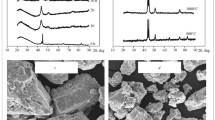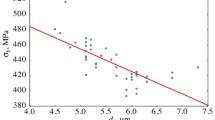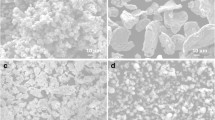Summary
-
1.
The optimum compacting pressures for niobium and molybdenum are 4000–6000 daN/cm2.
-
2.
The maximum compact density is secured under the following sintering conditions:
-
a)
for molybdenum: temperature 2173°K, isothermal holding for 4–5 h, environment-hydrogen;
-
b)
for niobium: temperature 2173°K, isothermal holding for 3–4 h, vacuum of 0.133 N/m2(l ·10−3mmHg).
-
3.
Molybdenum and, particularly, niobium show little tendency to strength loss in the temperature range 293-1473°K.
Similar content being viewed by others
Literature cited
M. Yu. Bal'shin, Collection: investigations of Heat-Resisting Alloys [in Russian] Moscow, Acad. Sci. USSR Press, (1958), p. 339.
M. Yu. Bal'shin and Tai Shou-vei, Izv. Akad. Nauk SSSR, Otdel. Tekhn. Nauk, Met. i Toplivo,3, 73 (1961).
Author information
Authors and Affiliations
Rights and permissions
About this article
Cite this article
Alekseeva, F.N., Matyushenko, R.S., Rakovskii, V.S. et al. The effect of technological factors on the density and strength of sintered refractory metals. Powder Metall Met Ceram 3, 292–294 (1964). https://doi.org/10.1007/BF00774173
Received:
Issue Date:
DOI: https://doi.org/10.1007/BF00774173




